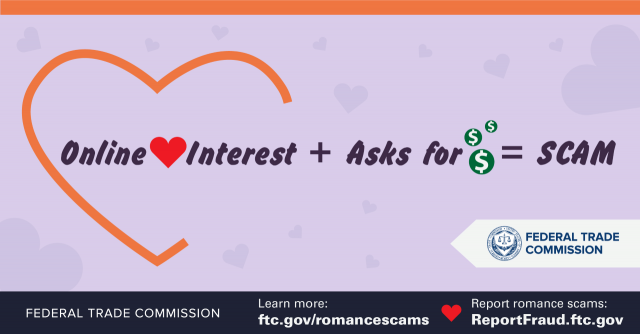Online Lover or Friend Scam

Fraudsters will prey on your emotions to get your personal information or money. They’ll pose as a lover or friend and come across caring, believable, and interested in you, trying to gain your trust; they’ll use the photo of an attractive person to catch your interest. Once you trust them, they make up a convincing story and ask you to send money to help them out. They’re trying to get you to send your own money or send money they’ve stolen from another person or business. They want you to help them because they’re setting you up to take the loss, while they make off with all the money.
Examples
- Your online lover doesn’t have a bank or credit union account of their own and can’t get one, so they ask if they can use your account to do some transfers. You agree and give them your checking account and debit card information. Later on, you see $20,000 deposited into your account, followed by several debit card withdrawals through the Cash App. After that, the bank or credit union notifies you this money was stolen, and you must pay it all back! By then, the money is gone, and your "lover" won’t respond to you.
- You meet a person online that is the military. They are stationed in a base in Europe, and they convince you to send money so they can make "investments," which always seem to have the possibility for a huge return. Even though you haven't met in-person, you trust them enough to send a bunch of money over through a payment app, only to discover later on that the investments aren't real. Your money is gone and can't be recovered by then.
Protecting Yourself
When dealing with people online, watch out for these warning signs:
- You can’t find anything about them online
- They tell you they love you right away
- They’re too perfect, either in their photos or interests
- They’re always traveling or live too far away to meet you in person
- They need money for emergencies or to make investments
- They push for your personal information or passwords
- They want you to keep this relationship a secret
- They try to isolate you from friends or family
If you suspect your online lover or friend may be scamming you, cut off all contact. Change any passwords you shared with them immediately.
If You Become a Victim
If you’ve sent money from your bank or credit union account, notify your bank or credit union immediately so they can try to limit the losses you sustain. File a complaint with the FBI’s Internet Crime Complaint Center (IC3) and your local police.
Watch this video from the FBI of a victim who got scammed by someone they met online:
